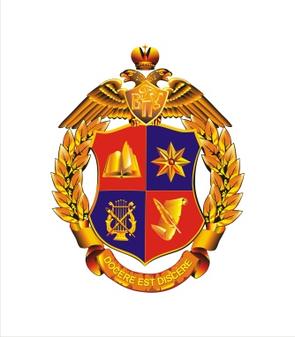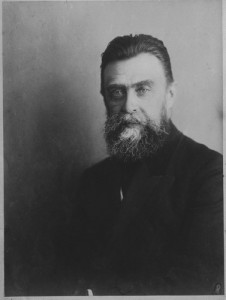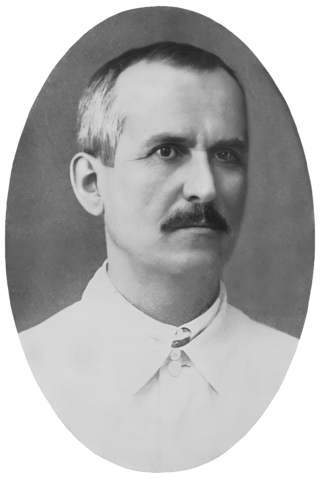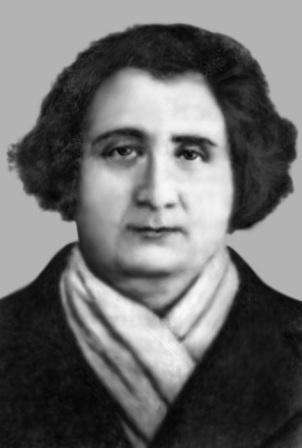
The Volgograd State Pedagogical University is one of the major pedagogical institutions in the Russian Federation. The university is located in Volgograd, formerly known as Stalingrad (Russia).
Baku Slavic University (BSU) is a public university located in Baku, Azerbaijan.

The 1st Gymnasium (Simferopol), officially Konstantin Ushinsky Gymnasium No.1 of Simferopol municipality Autonomous Republic of Crimea (Ukrainian: Гімназія №1 ім. Ушинського Сімферопольської міської ради Автономної Республіки Крим), is a secondary school (gymnasium) founded in 1812 in Simferopol, Crimea.

Herzen University, or formally the Russian State Pedagogical University in the name of A. I. Herzen is a university in Saint Petersburg, Russia. It was formerly known as the Leningrad State Pedagogical Institute. It is one of the largest universities in Russia, operating 20 faculties and more than 100 departments. Embroidered in its structure are the Institute of Pre-University Courses, the Institute of Continuous Professional Development, and the Pedagogical Research Center. The university is named after the Russian writer and philosopher Alexander Herzen.

Vsevolod Oleksandrovych Holubovych was the prime minister of the Ukrainian People's Republic from January to March 1918.

Ivan Yakovlevich Yakovlev was a Chuvash enlightener, educator, and writer.

Borys Dmytrovych Hrinchenko was a classical Ukrainian prose writer, political activist, historian, publicist, and ethnographer. He was instrumental in the Ukrainian cultural revival of the late 19th and beginning of the 20th centuries.

South Ukrainian National Pedagogical University named after Kostiantyn Ushynskyi is a public university in the large city of Odesa. Founded in 1817, SUNPU is one of the oldest educational institutions of Ukraine and the first teaching one on the northern Black Sea coast.

Volodymyr Pavlovych Naumenko was a pedagogue and public figure in the city of Kyiv as well as a good publicist. Upon the establishment of the Central Council of Ukraine for couple of weeks he served as its chairman until Mykhailo Hrushevsky returned from his exile. Later Naumenko also was appointed as a minister of education. He was executed by the Cheka for "counter-revolutionary activity".

Volodymyr Musiiovych Chekhivskyi was a Ukrainian activist and politician who served as Chairman of the Council of People's Ministers of the Ukrainian People's Republic from December 1918 to February 1919. Previously, he was a member of the Russian State Duma and Russian Constituent Assembly. Chekhivskyi was also among the founders of the Ukrainian Autocephalous Orthodox Church, and the brother of conductor and singer Oleksa Chupryna-Chekhivskyi.
Ilya Illych Kazas b.11(23) March 1832 Armyansk – d.14(27) January 1912 Yevpatoria, was an outstanding educator, teacher and poet among the Crimean Karaites. Despite coming from a simple family background, he became one of the most prominent members of Crimea's Karaim community in his era. Ilya Kazas was a highly educated man who knew 11 languages, including 4 ancients.

Oleksandr Glotov is a Ukrainian literary historian, journalist, member of the Ukraine's National Union of Journalists, Doctor of Philological Sciences, and professor.

Viktor Petrovich Ostrogorsky‹See Tfd›Russian: Виктор Петрович Острогорский, (16 February 1840, Saint Petersburg, Imperial Russia — 31 January 1902, Valday, Novgorod Governorate, Imperial Russia was a Russian writer, pedagogue, publisher, translator and social activist.

The Smolny Institute of Noble Maidens of Saint Petersburg was the first women's educational institution in Russia that laid the foundation for women's education in the country. It was Europe's first public educational institution for girls.
Komi State Pedagogical Institute is a higher education institution founded on 18 November 1931 to train teachers. Reorganized on 14 February 2013 as a merger with Syktyvkar State University.

Pelaheia or Polina Yakivna Lytvynova-Bartosh (1833–1904) was a Ukrainian ethnographer and folklorist.

Hanna Vasylivna Arsenych-Baran was a Ukrainian novelist, poet, school teacher and writer of prose. She was the author of more than a hundred textbooks on the Ukrainian language and literature as well as multiple dictionaries. Arsenych-Baran was a teacher who taught the Ukrainian language and literature in Chernihiv and educated students at the K. D. Ushinsky South Ukrainian National Pedagogical University. She won the Mykhailo Kotsyubynsky Regional Prize and the Leonid Glibov Regional Prize. Arsenych-Baran was a member of the National Writers' Union of Ukraine, become chair of its Chernihiv regional organisation in November 2016.

Oleksandra Mykhailivna Bandura was a Soviet Ukrainian teacher and literature scholar who worked as an educator at the Instytut pedahohiky from 1951 until 1991 and as a senior researcher at the Department of the Methodology of Teaching History of Ukraine between 1956 and 1987. She was strongly interested in the issue concerning the creation of textbooks and the problem with educating the theory of teaching literature in school, and was the author of more than 110 scientific works. Bandura was made a laureate of the State Prize of Ukraine in Science and Technology in 1977.

Olena Kurylo was a Ukrainian linguist and specialized in Ukrainian dialects and folklore. She helped in codifying the orthography in 1928-1929. Her contributions in Ukraine linguistics include both theoretical as well as practical. She was the author of textbooks in Ukrainian language, and compiled the Ukrainian scientific terminology.

Jonas Vabalas-Gudaitis was a Lithuanian psychologist, educator, agronomist, hydrologist, philosopher of language, criminology and ethics, and professor of the Vytautas Magnus University and Vilnius University. A member of the Freethinkers' Society of Ethical Culture, he is best known as the beginner of experimental psychology and scientific pedagogy in Lithuania, being one of the first in Europe to apply the principle of synergetic interaction in pedagogy and psychology.


















